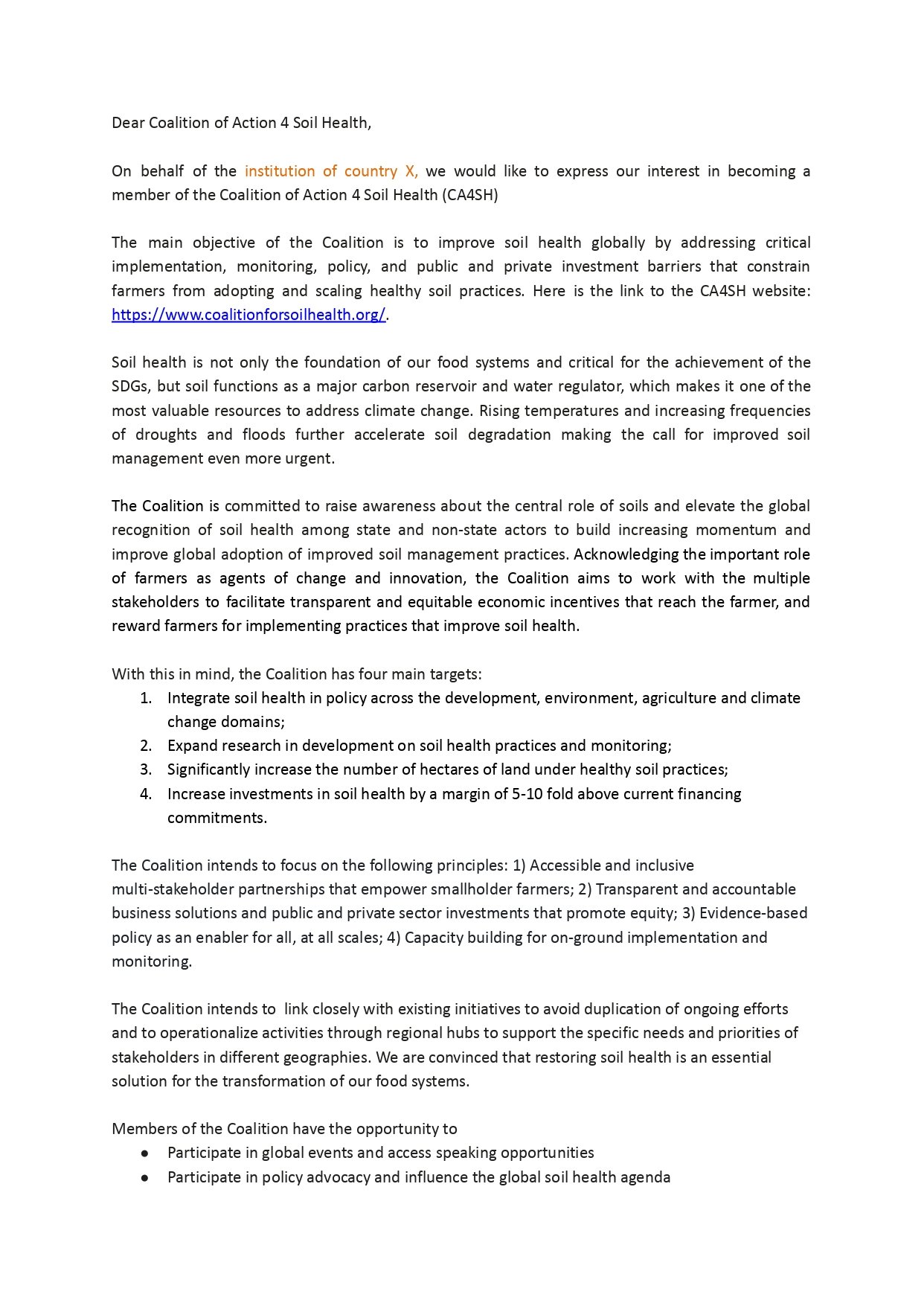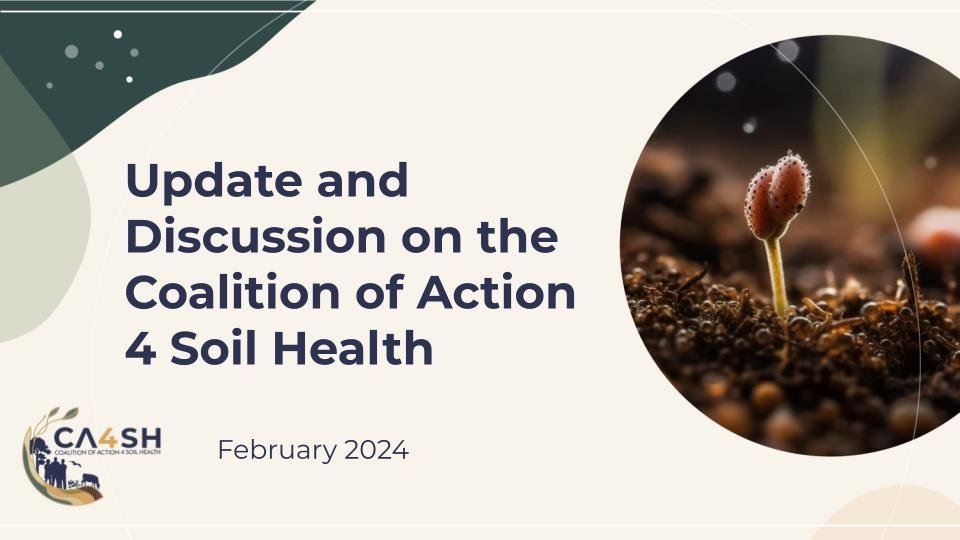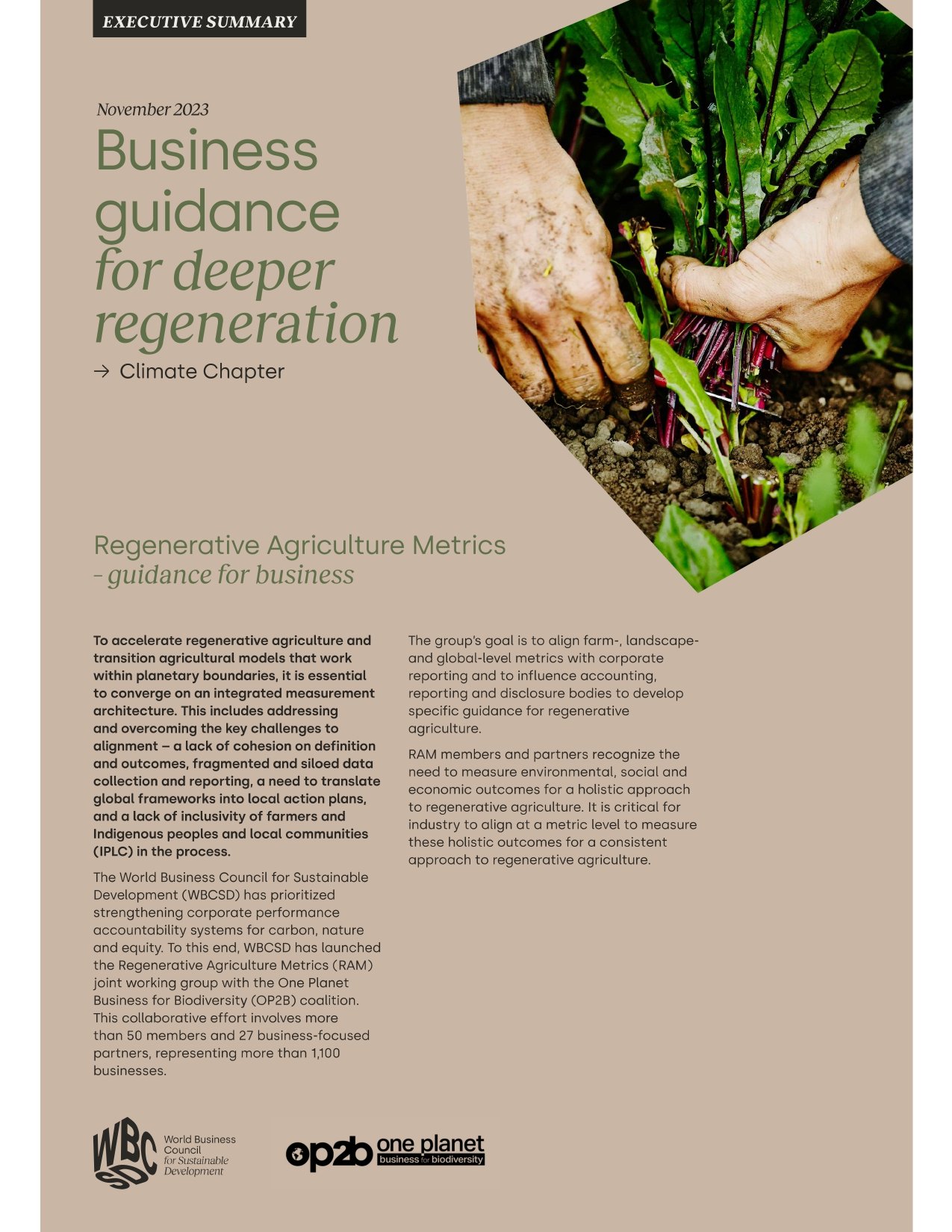Resource Library
Feature Resource:

CA4SH Brochure
The Coalition of Action 4 Soil Health (CA4SH) grew out of the 2021 United Nations Food Systems Summit (UNFSS). The objective of the Coalition is to scale soil health globally. Download the brochure to find out more.

CA4SH Support Letter
The support letter is a non-binding agreement between CA4SH and stakeholders interested in joining the Coalition.
Learn more about membership on our Membership page

2023 CA4SH Annual Report
For the Coalition of Action 4 Soil Health (CA4SH), 2023 was marked by continual learning and exponential growth, and we are celebrating by launching the inaugural Annual Report. Highlights include a reflection on our roots and growing the Coalition (which now has over 170 multistakeholder members and counting!), zooming in on key engagements, advocating for soil health in the climate agenda, achievements, lessons learned, and a look at what’s to come.

Soil Health Industry Platform: Report and Priority Actions for 2024
The Sustainable Soils Alliance (SSA) has been tracking the food industry’s progress in regards to regenerative agriculture and soil health initiatives via its Soil Health Industry Platform (SHIP). The 2023 SHIP report highlights our key Observations, soil-related Business Initiatives and based on our analysis we’ve recommended six Priority Actions to take forward in 2024.

CA4SH Working Groups Meeting Presentation (March 2024)
Learn more about the objectives and foci for the four thematic working groups in 2024.

Advocating for Soil Health
This presentation is for use by CA4SH members and stakeholders to introduce CA4SH and communicate key messages around why we should scale soil health.

February 2024: CA4SH Quarterly Partners Meeting Presentation
Download the full presentation from the CA4SH Quarterly Partners meeting on 28 February 2024.
Topics included highlights from our 2023 engagement, upcoming initiatives, partner presentations, and group brainstorming of on the strategic direction of CA4SH.

Update and Discussion on the Coalition of Action 4 Soil Health (CA4SH): February 2024
This presentation is for use by CA4SH members and stakeholders to introduce CA4SH, its objectives, scope and our ongoing activities.

Healthy soils sustain foodsystem transformationsto contribute to the net zeroCO2emission target by 2050
Food system transformation is needed for "safeguarding food security and ending hunger, and the particular vulnerabilities of food production systems to adverse impact of climate change".
Read the full policy brief from 4p1000, CIRAD, and IRD

Payments for Ecosystems Services to Support Transitions to Sustainable Agriculture and Land Use
This brief focuses on Payments for Ecosystems or Environmental Services (PES) as a mechanism for providing incentives to land users to transition to more sustainable land management.
Agriculture and food systems are both drivers and victims of escalating climate and nature crises, in turn increasing the risks to healthy diets, livelihoods and economies. Public policies can set incentives for farming and market practices that further exacerbate these trends, but they can also play a role in reversing them. The global Agriculture Policy Dialogue on Transition to Sustainable Agriculture is a peer-to-peer platform to share experience, facilitate partnerships and catalyse policy leadership to accelerate the transition to sustainable agriculture and food systems that benefit people, prosperity and the planet.
Policy Pathway Briefs provide an overview of emerging experiences and lessons on policy approaches that contribute to this transition, covering a series of topics requested by Policy Dialogue members, to support peer leaning and knowledge exchange. The briefing notes are in no way exhaustive. The options facing governments will be context specific and look different across and within countries. The notes aim to act as a discussion starter and to facilitate exchanges between countries engaged in the Agriculture Policy Dialogue and with other global initiatives, drawing on the experiences presented by members and examples identified through further research.

Promoting Healthy Soils and Land
This brief focuses on soil health, identifying policy instruments and actions for governments to provide incentives and support to farmers to protect and restore agricultural soils.
Agriculture and food systems are both drivers and victims of escalating climate and nature crises, in turn increasing the risks to healthy diets, livelihoods and economies. Public policies can set incentives for farming and market practices that further exacerbate these trends, but they can also play a role in reversing them. The global Agriculture Policy Dialogue on Transition to Sustainable Agriculture is a peer-to-peer platform to share experience, facilitate partnerships and catalyse policy leadership to accelerate the transition to sustainable agriculture and food systems that benefit people, prosperity and the planet.
Policy Pathway Briefs provide an overview of emerging experiences and lessons on policy approaches that contribute to this transition, covering a series of topics requested by Policy Dialogue members, to support peer leaning and knowledge exchange. The briefing notes are in no way exhaustive. The options facing governments will be context specific and look different across and within countries. The notes aim to act as a discussion starter and to facilitate exchanges between countries engaged in the Agriculture Policy Dialogue and with other global initiatives, drawing on the experiences presented by members and examples identified through further research.

Promoting Efficient Use and Greener Production of Fertilizers
This brief focuses on fertilizers and provides guidance on policy actions that can incentivize efficient and more sustainable use and production of synthetic fertilizers.
Agriculture and food systems are both drivers and victims of escalating climate and nature crises, in turn increasing the risks to healthy diets, livelihoods and economies. Public policies can set incentives for farming and market practices that further exacerbate these trends, but they can also play a role in reversing them. The global Agriculture Policy Dialogue on Transition to Sustainable Agriculture is a peer-to-peer platform to share experience, facilitate partnerships and catalyse policy leadership to accelerate the transition to sustainable agriculture and food systems that benefit people, prosperity and the planet.
Policy Pathway Briefs provide an overview of emerging experiences and lessons on policy approaches that contribute to this transition, covering a series of topics requested by Policy Dialogue members, to support peer leaning and knowledge exchange. The briefing notes are in no way exhaustive. The options facing governments will be context specific and look different across and within countries. The notes aim to act as a discussion starter and to facilitate exchanges between countries engaged in the Agriculture Policy Dialogue and with other global initiatives, drawing on the experiences presented by members and examples identified through further research.

Regenerative Agriculture Metrics: Guidance for Business
To accelerate regenerative agriculture and transition agricultural models that work within planetary boundaries, it is essential to converge on an integrated measurement architecture. This includes addressing and overcoming the key challenges to alignment – a lack of cohesion on definition and outcomes, fragmented and siloed data collection and reporting, a need to translate global frameworks into local action plans, and a lack of inclusivity of farmers and Indigenous peoples and local communities (IPLC) in the process.
The World Business Council for Sustainable Development (WBCSD) has prioritized strengthening corporate performance accountability systems for carbon, nature and equity. To this end, WBCSD has launched the Regenerative Agriculture Metrics (RAM) joint working group with the One Planet Business for Biodiversity (OP2B) coalition. This collaborative effort involves more than 50 members and 27 business-focused partners, representing more than 1,100 businesses.


Soils and sustainable development goals of the United Nations: An International Union of Soil Sciences perspective
Abstract
Being critical to achieving Sustainable Development Goals (SDGs) of the United Nations, strengthening understanding of the properties and processes of soil at national and regional scales is imperative. The necessity to realize SDGs by 2030 also inspires a greater sense of responsibility and care for soils…

Natural Carbon Sequestation: Leveraging Soils for Mitigation, Storage & Biodiversity Benefits
This presentation was given in a side event from the British Society of Soil Science at the UNFCCC COP28 in Dubai.
Learn more and download the presentation

EU Mission Soil Week Event Material
The European Mission Soil Week is an annual event aimed at promoting the Mission Soil, raising awareness about the importance of soil health, and driving action to protect and restore our soils.
The EU Mission Soil Week website has compiled a library of event materials from the November 2023 event including presentations, recordings, graphics and more.

Food Forward NDCs: Guidance to enhance NDC ambition and implementation for agriculture and food systems transformation
FOOD FORWARD NDCs is a simple, interactive, web-based tool that presents users with tangible, evidence-backed policy options and measures, and available literature for transitioning to nature-positive, healthy, and resilient food systems through NDCs. The available policy options can be tailored to a country’s specific food system priorities and different intervention areas of the food system, such as food environment, food governance, food production, supply chain, and consumption. The guidance does not intend to prescribe solutions, but instead, presents a menu of policy options as a starting point for decision-makers to further develop and implement on-theground measures for food systems transformation based on national and local contexts.
Download the full primer document from WWF

COP28 UAE Declaration on Sustainable Agriculture, Resilient Food Systems, and Climate Action
The COP28 Presidency today announced that 134 world leaders have signed up to its landmark agriculture, food and climate action declaration.
Download resources from the COP28 Presidency

Towards a definition of soil health
The Intergovernmental Technical Panel on Soils (ITPS) defines soil health as “the ability of the soil to sustain the productivity, diversity, and environmental services of terrestrial ecosystems”. In managed systems, soil health can be maintained, promoted or recovered through the implementation of sustainable soil management practices. As with human health, there is no single measure that captures all aspects of soil health. The preservation of these soil services requires avoiding and/or combating all types of soil degradation.
